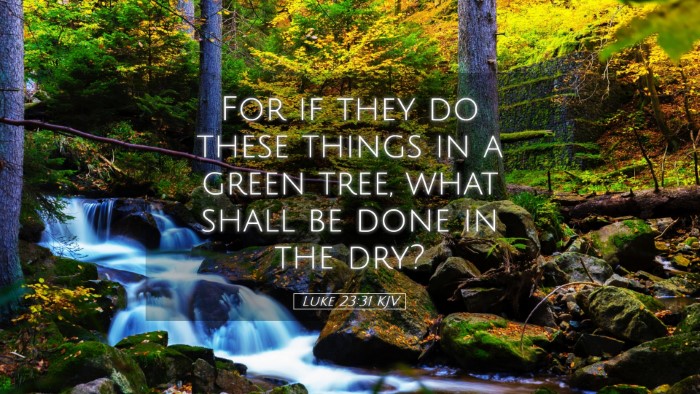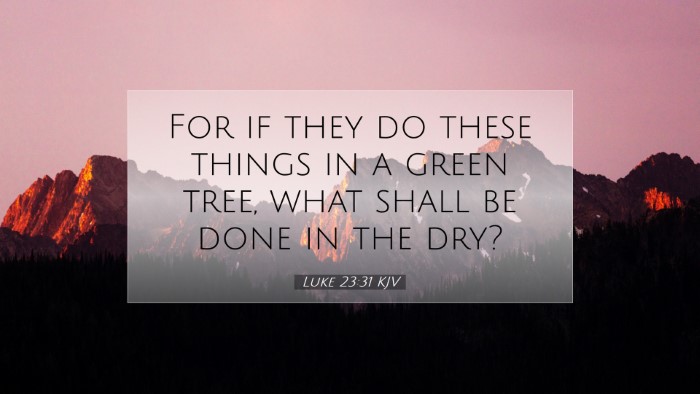Commentary on Luke 23:31
Verse Reference: Luke 23:31 - "For if they do these things in a green tree, what shall be done in the dry?"
Introduction
This verse, spoken by Jesus during His journey to crucifixion, is rich with theological implications. It is a poignant moment that reveals Christ’s deep understanding of His mission and the fate of Jerusalem. The significance of this statement sheds light on the condition of the Jewish people and the inevitability of judgment.
Contextual Analysis
In the broader context of Luke 23, Jesus is being led to be crucified, and He encounters a group of mourners who are lamenting His fate. His response is not only a reflection on His own suffering but also a prophetic insight into the fate of those who reject Him.
Matthew Henry notes that Jesus, being innocent and righteous (the "green tree"), indicates that the calamity upon Him is unjust. In contrast, those who are unrepentant and sinful (the "dry tree") will face a more severe punishment. This places an emphasis on the idea of proportional judgment based on one's state before God.
Theological Implications
1. The Innocence of Christ: The "green tree" imagery signifies vitality, innocence, and the flourishing state of Jesus's ministry on earth. Adam Clarke highlights that the term implies that since Jesus, the sinless one, faces such grave adversity, the judgment for those who persist in sin must be far worse.
2. The Nature of Judgment: Albert Barnes points out that the statement serves as a caution regarding the terrible consequences of unrepentant sin. If Christ, who is without sin, experiences the horrors of crucifixion, what will be the fate of those irretrievably lost in their transgressions? This generates a stark contrast between the righteous and the unrighteous.
3. Prophetic Warning: This statement can also be viewed as a prophetic warning concerning the coming destruction of Jerusalem in A.D. 70. As Clarke observes, the destruction would not only affect those physically present during Christ's crucifixion but extend to the entire community that rejected Him. The 'dry tree' metaphorically speaks to the lack of spiritual life and vitality that has resulted from their disobedience.
Pastoral Application
This verse can be a powerful focal point for sermons or teachings directed toward the unrepentant and the spiritually apathetic. The pastor may encourage congregants to evaluate their spiritual state in light of Christ’s suffering and the warnings of impending judgment for those who do not turn from their sins.
1. Call to Repentance: The imagery encourages a call to repentance, emphasizing that it is better to acknowledge one’s sin and turn back to God, lest one end up as a “dry tree.” This provides an opportunity for pastors to remind the congregation of God's mercy amidst judgment.
2. Understanding Suffering: For believers experiencing suffering, this verse reassures that Christ’s suffering is linked to a greater purpose. The green tree reminds us that suffering can produce spiritual fruit, and we are never alone in our trials.
3. Proclaiming the Gospel: In light of this scripture, it becomes imperative for Christians to share the gospel and warn others. The implications of being a “dry tree” can motivate evangelistic efforts and lead to a deeper commitment to living out the gospel truth.
Conclusion
Luke 23:31 encapsulates profound truths regarding Christ's innocence versus humanity’s culpability. It provides a solemn reminder of the possible outcomes based on one's response to Christ. For those serving in ministry, whether pastors, students, or theologians, the reflections derived from this verse can shape both personal faith and the collective mission of the church.
In dealing with this text, we are urged to grapple with the weight of our own sin and the grace extended through Christ. Let us convey these truths compassionately, ensuring our message resonates with the urgency of spiritual vitality and the necessity of repentance.


